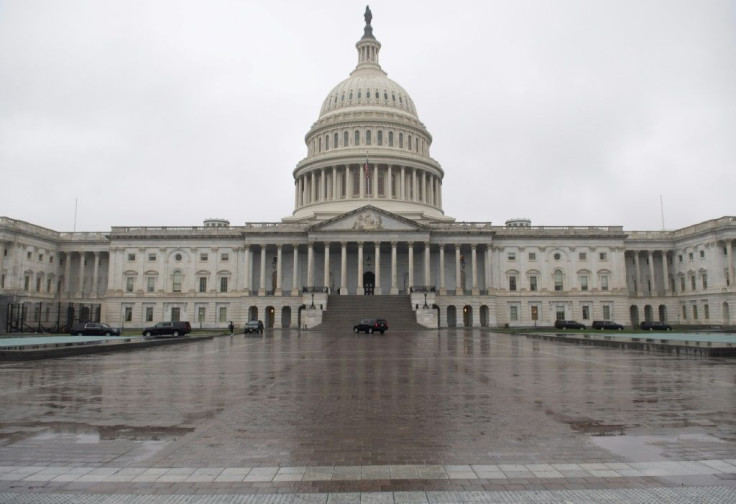What Is The Coronavirus Stimulus Package? Everything Americans Should Know

KEY POINTS
- The largest Congressional economic relief package in American history has something for employees, employers and the hardest hit by the COVID-19 crisis
- It was approved 96-0 in the Senate
- Its swift approval by the House is certain with president Trump expected to sign it by Friday
The largest economic stimulus package in U.S. history -- the $2 trillion coronavirus relief package -- approved by a 96-0 vote in the Senate Wednesday night will be signed into law by president Donald Trump Friday after its approval by the House in a voice vote.
In its 880 pages, the comprehensive relief package will give ordinary Americans, hospitals, healthcare workers and businesses reeling from the massive economic damage wrought by the COVID-19 pandemic a lot to cheer about.
For individual Americans, the bitterly fought-over legislation includes Democrat demands for direct payments, stronger unemployment insurance and requires insurance providers cover preventive services for COVID-19. It guarantees loans and grants to businesses to the tune of billions of dollars. It also provides billions of dollars in healthcare resources for hospitals, states and municipalities.
The Senate rushed to pass the broad and massive aid bill ahead of depressing data to be released Thursday morning that will show a record-breaking and historic spike in unemployment claims ranging from one million to four million.
“This is a proud moment for the United States Senate and for the country and we’re going to win this battle in the very near future,” said Senate Majority Leader Mitch McConnell, R-KY, after the vote.
Highlights of the coronavirus relief package, per CNN:
- Substantial direct payments to individuals. Single Americans will receive $1,200, married couples will get $2,400 and parents will receive $500 for each child under age 17. On the other hand, payments will start to phase out for individuals with adjusted gross incomes of more than $75,000. Those making more than $99,000 won't qualify. The thresholds are doubled for couples.
- Huge and historic boost in unemployment benefits. The federal government will give jobless workers an extra $600 a week for four months on top of their state benefits, which range from $200 to $550 a week, depending on the state. In addition, 13 weeks of extended benefits will be fully covered by the federal government. As of now, state unemployment checks last from 12 to 28 weeks, depending on the state.
The deal also calls for a new pandemic unemployment assistance program that will provide jobless benefits to the unemployed, partially unemployed or unable to work because of the virus and don't qualify for traditional benefits. This proviso includes independent contractors and the self-employed and gig economy workers. These benefits will be similar to what's available in a state.
- A massive $500 billion lending program in loans, loan guarantees and investments from the Treasury department. This amount includes $25 billion for passenger air carriers, $4 billion for cargo air carriers and $17 billion for businesses that work in national security. The $454 billion balance will go to loans to businesses, states and municipalities.
The measure, however, includes restrictions on businesses that receive the loans. A specific provision in the program for direct loans to mid-sized businesses and non-profit organizations will require no payments for the first six months after the loan is issued. - Tough protections against foreclosures and evictions. The bill includes housing protections against foreclosures on mortgages and evictions for renters. It also doesn't allow fees, penalties or additional interest to be charged as a result of delayed payments.
- Aid to hospitals. The stimulus package will provide $117 billion for hospitals and creates a $100 billion public health and social emergency fund to reimburse providers for expenses and lost revenues related to the coronavirus pandemic. The legislation also boosts reimbursements by 20% for treating Medicare patients with coronavirus.
- No money for Trump's businesses. The legislation prohibits federally elected officials and their immediate relatives from obtaining funds from the $500 billion program. It specifically states businesses owned or partly owned by "the President, the Vice President, the head of an Executive department, or a Member of Congress; and the spouse, child, son-in-law, or daughter-in-law" will be barred. The provision applies to anyone with 20% or greater stake in a business.
- Assistance to airlines and airports. The package includes $32 billion in grants for wages and benefits to the badly hit airline industry now verging on collapse. It provides $25 billion for passenger airlines, $4 billion for cargo airlines and $3 billion for industry contractors.
- Companies that receive this assistance are barred from making furloughs, pay cuts, or stock buybacks. They also can't issue dividends to investors through September, and institutes limits on executive compensation.
© Copyright IBTimes 2024. All rights reserved.





















